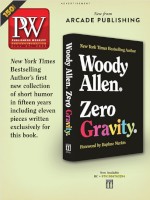The programming portion of this year’s Children’s Institute got off to a joyful start on Tuesday, June 21, with a breakfast keynote by author, lawyer, and activist Karen Walrond, who greeted booksellers with words of affirmation and gratitude. “You all are amazing,” she said. “The fact that you open kids’ minds to real-life heroes, fantasy heroes, and heroes who look like them—ya’ll are my kind of people.”
Walrond spoke about her experience growing up in a small fishing village in Trinidad, raised by book-loving parents: her father holds a PhD in engineering and her mother speaks five languages. As a result, Walrond had an early and intense love of reading. “Even my parents were concerned,” she joked. “My mom told me, ‘Go outside!’ So, I brought my book outside.”
She went on to share the inspiration for her latest book, The Lightmaker’s Manifesto: How to Work for Change Without Losing Your Joy (Broadleaf Books, 2021). In January 2020, Valerie Weaver-Zercher, an editor at Broadleaf, contacted Walrond about the possibility of writing a book on the intersections of joy and activism. Walrond immediately said yes, though she harbored inner doubts. “I’m not an activist,” she thought. “Activists get teargassed and stand in front of tanks in Tiananmen Square.” So the author decided to interview friends and colleagues, activism-minded individuals whom she refers to as “lightmakers,” including Brené Brown and founder of the #MeToo movement Tarana Burke. It was through speaking with them that Walrond came to recognize the value of her own contributions. She signed her contract with Broadleaf in March 2020, and then the pandemic hit.
“It was actually such a gift [to write this book] when everything seemed hopeless,” she said. “There’s something about talking to people who’ve made it their life’s work to make the world better.” Walrond stressed the positivity that can emerge from adversity, “Joy is bigger than happiness. It’s often derived from meaningful and purposeful action, pain, and difficulty. When viewed that way, joy seems close to activism—and I would argue that’s what you do as booksellers,” she said. “Welcome, lightmakers. It’s so great to be here with you.”
Walrond offered her advice for carrying on this work in challenging times, including amid the lingering obstacles posed by the pandemic and the rise in book challenges and banning. Using the metaphor of building a fire, she encouraged booksellers to begin by “creating a clearing,” or space to do the work; “gathering tinder” (i.e. skills and expertise); “finding your spark”; and finally, “tending your flame” by making and maintaining a supportive community. She said that although change may not happen in our lifetime, “the goal is to take the torch from those who came before us, and pass it on to those who come after.” And that’s precisely what booksellers do when the place a book in a child’s hands, she said.
Following her remarks, Walrond appeared in conversation with Kim Hooyboer, director of education for the American Booksellers Association. When asked to name additional tools for making and maintaining joy, Walrond cited her practice of taking a self-inventory to assess challenges and form goals and action plans based on personal strengths; gratitude journaling; fostering mindfulness; taking time to rest; and listening to oneself and to the needs of the community. “Let’s face it, we don’t go into activism because things are good,” Walrond said. Activism involves “shared experiences of meaning,” and it is beneficial to unwind and celebrate too, “to gather the energy to go back in.”
Walrond wrapped up by recalling how her practice of focusing on gratitude and finding community helped her and her family recover from the devastating loss of their Houston home in 2018 due to Hurricane Harvey. “Even during that time, I could always think of at least one good thing,” she said, including the kindness of her neighbors. She also gave a shout-out to her local indie bookstore, Blue Willow Bookshop, “for taking care of the community” throughout the pandemic. The community in turn showed up for the bookstore, she said: “You give love, you get love.”
Booksellers clearly resonated with Walrond’s words. In a session immediately following the keynote, titled “Storytime as Performance,” Ari Ray Agnew, children’s specialist at Book Passage in Corte Madera, Calif., referred back to the author’s framing of bookselling as joyful activism, saying, “When you invest energy in reading a book to kids, it becomes a performance or play, and play is a kind of joy."



 Volume 269
Issue 27
06/27/2022
Volume 269
Issue 27
06/27/2022





